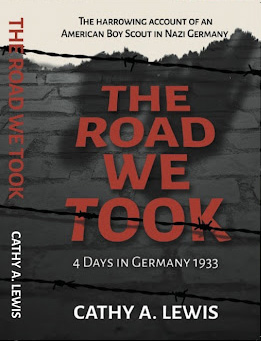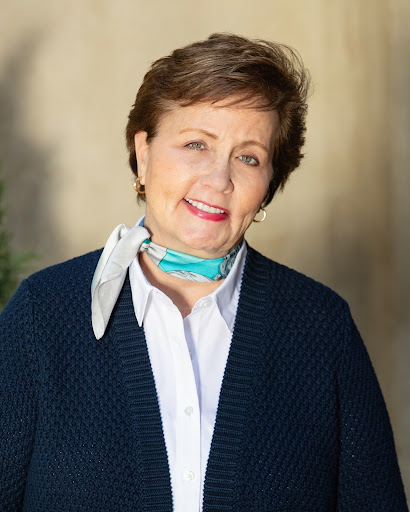 NASHVILLE, TN – Debut author Cathy A. Lewis hits the scene with a historical fiction novel that looks into Hitler’s deadly plans nine years before the start of World War II and the Holocaust.
NASHVILLE, TN – Debut author Cathy A. Lewis hits the scene with a historical fiction novel that looks into Hitler’s deadly plans nine years before the start of World War II and the Holocaust.
Lewis came up with the idea in 2018, after rediscovering a small, tattered suitcase belonging to her deceased father featuring his daily journal and mementos from his six-week trek in 1933 through Europe with his Boy Scout Troop on their way to the 4th World Scout Jamboree held in Godollo, Hungary.
Inspired by her father’s historical recount and stories shared with her during her youth, The Road We Took: Four Days in Germany 1933 is the epic tale of an American Boy Scout who discovers by coincidence four desperate Jewish citizens attempting to escape Nazi Germany.
Fascinating characters come together in a narrative of extreme courage, budding adolescent love, and their fight for survival in this gripping novel.
Life in Germany would never be the same as Hitler and the Nazis advanced their propaganda campaign to systematically murder the Jewish population and anyone that does not fit the Aryan ideals. And this was only the beginning.
“The Road We Took”
Cathy A. Lewis | February 15, 2022| Independently Published | Historical Fiction Paperback | 978-1-7370267-0-9 | $18.99 | Ebook | B09G5FL33J | $9.99
More about Cathy A. Lewis
 Cathy has spent over 40 years as a professional chef after graduating from the Culinary Institute of America in New York. She was the first female Executive Chef for the Servico Corporation, where she served The Philadelphia Eagles, The Philadelphia Flyers and The Philadelphia 76’ers. Over the course of her career, Cathy capitalized her creative talents as a restaurant owner and partner, conceptualizing and creating brands for three successful startup businesses, Food Works, in Pittsford, New York, The Bagel Bin in Penfield, New York, and The Nick of Thyme in Brentwood, Tennessee. It was at the Nick of Thyme that Cathy developed long standing relationships within the music industry. Her clients included Donna Summer Sudano, Naomi Judd, Wynonna Judd, numerous Christian and country music artists, world-renowned wine collectors Billy Ray Hearn and Tom Black. After the sale of her business, Cathy cooked for and traveled extensively to movie locations with actress and activist Ashley Judd and her husband, three-time Indy 500 champion Dario Franchitti. She continues to cook privately for exclusive clients and friends.
Cathy has spent over 40 years as a professional chef after graduating from the Culinary Institute of America in New York. She was the first female Executive Chef for the Servico Corporation, where she served The Philadelphia Eagles, The Philadelphia Flyers and The Philadelphia 76’ers. Over the course of her career, Cathy capitalized her creative talents as a restaurant owner and partner, conceptualizing and creating brands for three successful startup businesses, Food Works, in Pittsford, New York, The Bagel Bin in Penfield, New York, and The Nick of Thyme in Brentwood, Tennessee. It was at the Nick of Thyme that Cathy developed long standing relationships within the music industry. Her clients included Donna Summer Sudano, Naomi Judd, Wynonna Judd, numerous Christian and country music artists, world-renowned wine collectors Billy Ray Hearn and Tom Black. After the sale of her business, Cathy cooked for and traveled extensively to movie locations with actress and activist Ashley Judd and her husband, three-time Indy 500 champion Dario Franchitti. She continues to cook privately for exclusive clients and friends.
When she is not working as a professional chef, she enjoys writing, reading, cooking for her family and special friends, taking photos of nature and food, gardening, watching open wheel racing, watching movie classics from the golden age of cinema on TCM, and chasing her two cats, Princess Poopie Peanut Head and Tout Suite. The Road We Took is Cathy’s first novel and partially conceived from her father’s journal of daily writings and documentations along with the narratives and tales he told Cathy as a young girl.
Follow Cathy on Instagram: @cathyalewis
And find her website at: https://www.cathyalewis.com.
In an interview, Cathy can discuss:
- How it felt finding her father’s journal containing his observations of what was taking place in Germany prior to Hitler’s rise to power, knowing what we do now about his intentions and actions.
- How the characters in the book relate to what she read in her dad’s journals and stories recounted to her as a young girl.
- Standout passages from her dad’s journals.
- What was the motivation for her to write about this time in history.
- The discovery of her family lineage through ancestry, and that role that this played in her desire to preserve history.
- Her thoughts on the discrimination her mother dealt with as a Jewish immigrant coming to the United States in 1944.
- Her standout moments from being a chef, as well as starting a new career after an established one.
An Interview with Cathy A. Lewis
Has writing always been a hobby of yours, or did finding your dad’s journals spark something for you?
I’ve always loved to write; I wrote poetry in my teen years and early 20’s. Then Chef-life took over, and my writing became limited to mostly menu creation and recipe writing. I would still write occasionally, primarily journals, and a few attempts at a book unrelated to this subject matter. My dad’s journal sparked something in me when I read one entry that chilled me to the bone.
What was your first thought when you realized what lay inside your dad’s journals?
My first thought was: I need a magnifying glass to read this fountain-penned cursive writing- the lines on the page were so narrow! Keep in mind at this time in 2018 this journal is 85 years old, and the ink became so embedded in the paper I had to buy a considerable light-enhanced magnifier when I first read it. Outside of the readability issue, my first thought was astonishment; I remembered the journal and my dad sharing his writing with me as a young girl; however, the stories he told me were what I remembered more than the journal. After re-discovering the suitcase and its contents, I felt it was only suitable to preserve this history for posterity sake, future generations, and another aspect of our family history which is quite rich. The journal records a 16 almost 17-year-old boy’s point of view, recording what he saw during his four days in Germany. The trucks, armaments, troops, weapons, parades with massive numbers of soldiers, the 40k gathering of Hitler Youth for a rally-all direct violations of the Treaty of Versailles. The world was situationally unaware that the Treaty of Versailles had already been violated.
Do you remember connecting with learning about the WWII era in school?
My childhood was traumatic for several reasons, and I don’t have a lot of recollection about those school years. However, a childhood friend of mine recently reminded me that all the Jewish kids were put in the back of the room in the last row of chairs whenever films were shown in school about WWII. That was 5th grade, and at that time, I was not aware I was Jewish. My love of history and passion for this era came later for me, my parents and my late brother being my biggest influences. My brother used to listen to lp records of speeches made by FDR during WWII, and my mom and dad would watch all the movies about WWII. My dad was a veteran who served during the war-my parents incidentally met on the army base in the Canal Zone of Colòn, Panama, where dad was stationed.
How did working as a chef prepare you to write this book?
There is a process I go through when designing a menu. I create a menu, do the research on recipes and sourcing ingredients, write the prep list, and then execute the dishes. I found when writing; I use the same process. I do the research, write the outline, and write the chapter. I discovered this fascinating application of the same skill set used between the two distinctly different professions.
How does it feel to take on this new project after establishing yourself as a chef the last 40 years?
This project came as a result of needing something highly creative to work on while recovering from major ankle surgery, where I couldn’t walk for six months-the book was born out of a need to keep from going bonkers while I recovered. Writing opens up an entire world of creative opportunity for me, in ways cooking could not. I can completely lose myself in writing, with no sense of time. It’s like shopping in a mall, with no windows, you walk outside astonished it’s become night. In a kitchen, time is always a major preoccupation. I find writing to be the creative outlet my brain yearned for, for many years. Writing seems to connect the deep chasm between my head and my heart.

A former award-winning journalist with national exposure, Marissa now oversees the day-to-day operation of the Books Forward author branding and book marketing firm, along with our indie publishing support sister company Books Fluent.
Born and bred in Louisiana, currently living in New Orleans, she has lived and developed a strong base for our company and authors in Chicago and Nashville. Her journalism work has appeared in USA Today, National Geographic and other major publications. She is now interviewed by media on best practices for book marketing.
